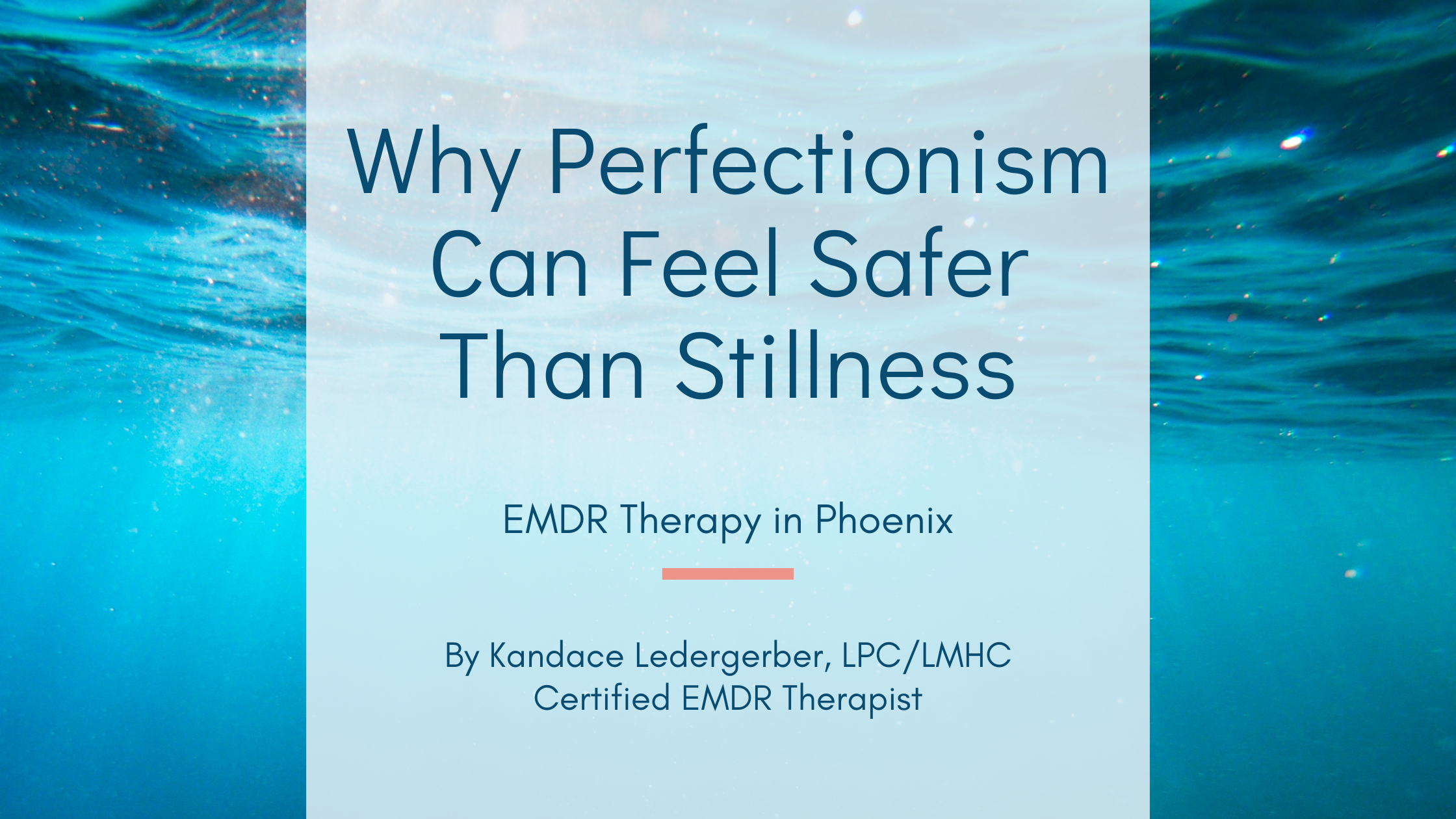Why Perfectionism Can Feel Safer Than Stillness | EMDR Therapy in Phoenix
Underwater-style blue background with soft light filtering through the water. Overlaid text reads “Why Perfectionism Can Feel Safer Than Stillness” with “EMDR Therapy in Phoenix” underneath, symbolizing the contrast between control, survival, and learning to feel safe in stillness.
Photo by Cristian Palmer on Unsplash
Peace sounds nice… in theory. But for many people, even the idea of peace can feel absolutely terrifying. Stillness creates space. And for trauma survivors, space can feel grating on your skin — somehow far too loud in its silence.
Perfectionism, on the other hand, feels familiar. Maybe not safe or good, but familiar. Even if it leaves you feeling burned out, on edge, or spiraling after a single misstep, it offers something predictable. Something that feels within your control.
But damn, is it exhausting. And deep down, you secretly dream of something more.
Why Perfectionism Feels Safe
Many people are surprised to learn that perfectionism isn’t a personality flaw — it’s a survival skill.
Your nervous system didn’t choose perfectionism at random. It learned it.
I think about the child who learned to stay quiet, small, and “good” to avoid explosive emotions at home. The teen who discovered that achievement brought praise (or at least less criticism). The adult who over‑prepares, over‑functions, and over‑gives because unpredictability once meant danger.
When your early environment felt unsafe, chaotic, or emotionally inconsistent, perfectionism offered structure. Control. Predictability.
And even if that strategy no longer serves you in adulthood, your nervous system still clings to it — because a familiar pain often feels safer than an unfamiliar calm.
Over time, perfectionism wires itself into our core beliefs that end up feeling absolute.
These beliefs often keep the mind in constant motion, even when the body is exhausted.
If I do everything right, maybe I won’t be criticized.
If I’m not productive, I’m failing.
If I slow down, something bad will happen.
These beliefs don’t live only in your thoughts — they live in your body.
The Hidden Cost of Perfectionism
On the surface you may look like you have it all together, but inside perfectionism and anxiety are exhausting you
Photo by Vasilis Caravitis on Unsplash
From the outside, perfectionism often looks like success.
Inside, it often feels like chronic anxiety or mental exhaustion, difficulty resting without guilt, a constant sense of being “on,” and emotional loneliness — even when surrounded by people.
Perfectionism becomes a mask. It protects you, but it also keeps others at a distance.
When acceptance is based on performance, connection stays conditional. You might be the reliable one, the strong one, the helper — but rarely the one who feels deeply held.
And stillness? Stillness threatens the mask. It invites vulnerability. It asks your nervous system to loosen control. No wonder it feels unsafe.
If you recognize this fear of slowing down, you may also resonate with EMDR Therapy Phoenix for Overthinkers, which speaks directly to the part of you that feels unsafe when things get quiet.
When Perfectionism Stops Working
Perfectionism can feel like wearing a mask — it hides your pain, but it also keeps you isolated.
Photo by John Noonan on Unsplash
Perfectionism serves as a coping skill, a maladaptive one, but still a coping skill. Most people don’t seek out therapy because they are tired of using it, they seek out therapy because it has become too inconvenient.
The panic attacks interrupt work. The burnout makes it harder to keep up. The exhaustion starts to interfere with the life they feel pressure to maintain — the productivity, the caretaking, the image of having it all together. And, not to mention, it is damn freaking exhausting.
At first, the goal isn’t usually to let go of perfectionism. It’s to get the symptoms under control so they can keep functioning.
But by the time someone reaches out for EMDR therapy in Phoenix or Tempe, the old strategy is no longer working the way it used to. The nervous system is overloaded. The cost is higher. The cracks are harder to hide.
People often arrive caught between two forces:
Fear — of slowing down, of opening up, of disrupting a system that once kept them safe.
And curiosity — a quiet wondering about whether there might be another way to live that doesn’t require this level of effort.
That tension, between wanting relief and fearing change, is often where deeper healing begins.
If perfectionism and anxiety have been running the show, you may want to learn more about how I work with anxiety and perfectionism in EMDR therapy and what support can look like beyond survival mode.
Why Stillness Feels Unsafe — And How EMDR Helps
Stillness isn’t dangerous. But your nervous system may experience it as unfamiliar, and unfamiliar once meant unsafe.
EMDR therapy doesn’t ask you to force calm, silence your thoughts, or "let go" before your body is ready. Instead, EMDR helps by reprocessing the experiences that taught your nervous system to stay hypervigilant, loosening rigid beliefs like I must perform to be safe, and building regulation skills so your body learns new ways to settle.
And here’s what I know, both as a therapist and as someone who’s sat in the client chair: movement is possible.
If you can trust the process and find a therapist you click with, layers of shame, fear, and anxiety start to shift. They get replaced with tools to regulate your body during the week. Old, rigid beliefs soften. And for the first time, peace can begin to feel less like a warning sign, and more like a possibility.
Making Peace Feel Possible Again
Here’s the uncomfortable truth that every perfectionist hates to hear - healing isn’t linear. It’s messy. It’s a leap forward, a step sideways, maybe even a step back, before another two or three steps forward again. It doesn’t happen overnight (though I wish it did). And it can be frustrating, because the beliefs we’re trying to undo have been there a long time.
You may notice moments of rest without guilt, softer self‑talk after mistakes, and a growing ability to pause instead of push.
Perfectionism is like continuing to wear armor that once kept you safe, but now weighs you down. With EMDR therapy in Phoenix, you don’t have to rip that armor off. You get to gently set it down, piece by piece, as your nervous system learns it no longer needs it.
You are already enough, even if perfectionism has tried to convince you otherwise.
About Kandace Ledergerber, LPC/LMHC
Kandace Ledergerber (she/her) is a trauma therapist and Certified EMDR Therapist serving Phoenix, Tempe, and all of Arizona and Florida virtually. She specializes in helping adults heal from childhood trauma, relationship wounds, anxiety, and nervous system dysregulation through EMDR therapy, trauma-informed care, and compassionate, collaborative treatment. Kandace offers weekly EMDR therapy in Phoenix as well as EMDR Intensives for clients seeking more focused support.
🌻 Take the Next Step
If you’re ready to start healing in a way that works with your brain and body, I’d love to support you. Book a Free 15-Minute Consultation and see if EMDR therapy in Phoenix is the right fit for your healing journey.
TL;DR
Perfectionism often develops as a survival strategy when safety and predictability are uncertain. While it once helped you cope, it can lead to burnout, anxiety, and emotional isolation. With EMDR therapy, you can gently release the grip of perfectionism and help your nervous system learn that stillness doesn’t have to be dangerous — it can be restorative.
You don’t have to keep performing to be worthy of care. You are already enough.




